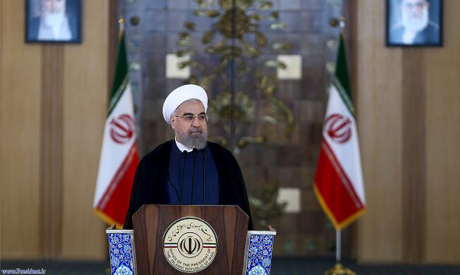
Iran's President Hassan Rouhani delivers a speech to the nation in Tehran, Iran July 14, 2015 (Photo: Reuters)
Following are the main points in the nuclear deal sealed in Vienna Tuesday by Iran and the P5+1 group -- the United States, China, Russia, Britain, France and Germany:
Iran will cut the number of uranium centrifuges -- which can enrich uranium for nuclear fuel but also for a nuclear weapon -- from 19,000 to 5,060, and maintain this level for 10 years.
All enrichment will take place at the Natanz facility. Fordo, built into a mountain to protect it from attack, will retain an additional 1,044 centrifuges but not for uranium enrichment.
Iran's current stockpile of several tonnes of low-enriched uranium will be reduced to 300 kilograms (660 pounds) and not rise for 15 years. Only enrichment to low purities is allowed, and for 15 years.
There will be limitations on specific research and development (R&D) activities. These activities cannot lead to the accumulation of enriched uranium.
Iran's Arak reactor will be redesigned so that it does not produce weapons-grade plutonium, the alternative to highly-enriched uranium for a nuclear weapon.
Iran will apply the Additional Protocol, allowing for closer inspections, including potentially of military bases.
The International Atomic Energy Agency (IAEA) will also employ high-tech surveillance equipment and have access to facilities such as uranium mines and centrifuge workshops for periods of up to 25 years.
Iran will also comply with a "roadmap" agreed with the IAEA on Tuesday to probe allegations of past efforts to develop nuclear weapons, which the watchdog aims to complete by mid-December.
A UN Security Council resolution endorsing the deal will terminate all provisions of previous resolutions on the Iranian nuclear issue simultaneous with the IAEA verifying Iran has implemented the above.
The same applies to US and EU nuclear-related sanctions imposed on oil exports, Iran's financial system and other areas.
Restrictions on arms sales can be lifted after five years or once the IAEA gives a "broad conclusion" that all Iranian nuclear activities are peaceful. For ballistic missiles the period is eight years.
Some deliveries would be possible with special permission of the UN Security Council, according to Russia.
A Joint Commission will be created comprising the six powers, the European Union and Iran to handle any problems, with a majority vote needed to decide whether there has been a violation.
Short link: